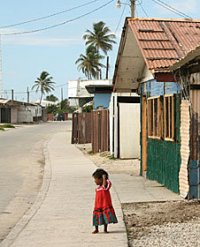Children of Armageddon: Or how I learned to hate the bomb again!
By Roger Landes
One of the most difficult aspects of making a good political documentary is finding a subject matter interesting enough in order to not only captivate an audience, but also to persuade them to believe in the position taken by the film. In other words, it better make people care. And at first glance, Children of Armageddon is in a very difficult position.
 People seem to have made their choices for what are the most important issues in the contemporary world, and activism in anything else seems to be trite. Global warming, the war in the Middle East, health care, and genocide in Darfur take up the upper hierarchy of pertinence, and everything else is considered to be of a lesser need. These issues are clearly the most crucial problems in our world today.
People seem to have made their choices for what are the most important issues in the contemporary world, and activism in anything else seems to be trite. Global warming, the war in the Middle East, health care, and genocide in Darfur take up the upper hierarchy of pertinence, and everything else is considered to be of a lesser need. These issues are clearly the most crucial problems in our world today.
Right?
Children of Armageddon digs up an argument that has been stewing for over half a century. The so-called “nuclear issue” has been pushed to the back burner to make room for the aforementioned other causes. Children of Armageddon brings the conversation back to pertinence by raising the question: “Who are the real victims of nuclear war?” It begins showing us the obvious answer. The Hibakusha, survivors of the Atomic Bomb droppings on Hiroshima and Nagasaki, fight to keep their tragedy relevant in a Japanese culture that is trying to forget their own history due to their reliance on America’s nuclear deterrence umbrella. Maki, a third generation Hibakusha, works to bring the fear of nuclear weaponry back into the youth of Hiroshima to raise awareness. She is faced with a resistant populous who would simply rather forget than accept a tremendous situation.
The effects of nuclear warfare effect areas outside of Japan as well. The U.S., France, and Great Britain have been testing nuclear warheads for decades. The test detonations for these warheads contaminate the land and cause horrible side effects to the surrounding peoples. The Marshall Islands, an American colony located between Hawaii and Guam, was host to nuclear tests for American bombs in the 1950s. In 1954, a bomb was detonated to close to the coast of Rongelap, a village near the coast. The entire town was contaminated with radioactive powder. This caused gene mutations in the women of Rongelap. These mutations have caused massive amounts of miscarriages and infant deformities. The mutations have transgenetic effects, so even 55 years after the testing, young women are still being affected by the bombings.
These lingering effects can be seen in other parts of the world. France did its nuclear testing in French Polynesia, but claimed there would be no repercussions because it was done underground. What they failed to realize is the movement of the radioactive materials through the soil into the water and soil. Due to this, French Polynesia has an incredibly high rate of leukemia, as well as thyroid and kidney cancer. Maurea, a young Tahitian woman, fights to end nuclear testing in order to raise her family in a healthy atmosphere. In the 1995, French President Jacques Chirac ignored protests by locals like Maurea as well as environmental groups and claimed that he would resume the nuclear testing at French Polynesia. He was met with such an opposition from the people that he almost immediately recanted his comments and disposed of a massive amount of nuclear warheads.
Children of Armageddon attempts to tackle an incredibly complex and difficult topic. Nations like the U.S. and France claim that their nuclear arsenal is a deterrent against other nations to use their weapons against them. The film states that even this is an inappropriate use of their power. The mere existence of a single nuclear warhead is too dangerous to the survival of the human species. Even its use as a deterrent is merely one country threatening all others. The films most interesting contribution is from the issues oldest and loudest opposition, Noam Chomsky. He states that at the very essence of the nuclear issue is that it is “the only threat to the species that can be immediately solved.” The message of Children of Armageddon is very much idealistic, but it is exactly what is needed in order to wake the public up to the importance of the topic.
Children of Armageddon is screening Tuesday September 22 at 7.30 PM at the Drexel. Admission is free, donations accepted.
view TRAILER







